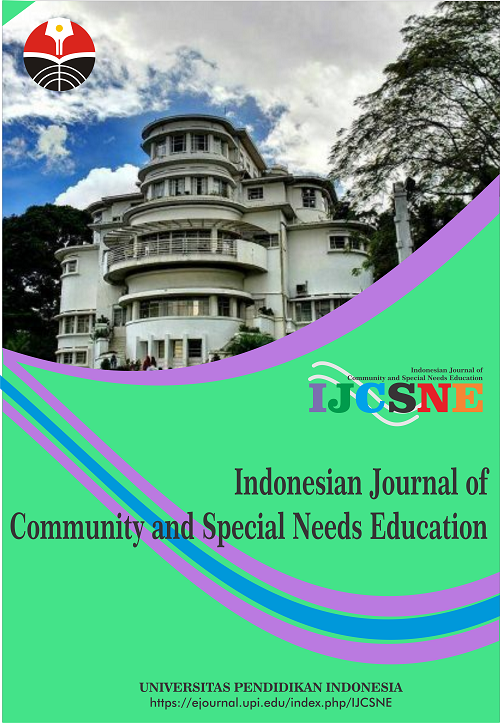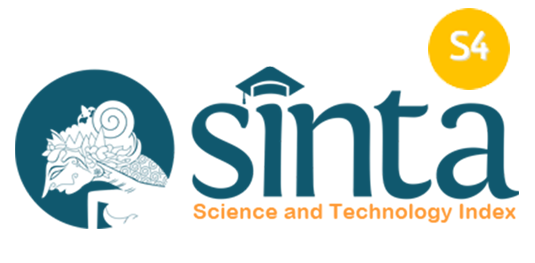Assessment of Mathematical Abilities of Students with Intellectual Disabilities During the COVID-19 Pandemic
Abstract
Keywords
Full Text:
PDFReferences
Astuti, W. P., Prasetyo, A. P. B., and Rahayu, E. S. (2012). Pengembangan instrumen asesmen autentik berbasis literasi sains pada materi sistem ekskresi. Lembaran Ilmu Kependidikan, 41(1), 31-43
Datnow, Amanda, and Lea Hubbard. (2015). "Teachers’ use of assessment data to inform instruction: Lessons from the past and prospects for the future." Teachers College Record, 117 (4), 1-26.
Fagginger Auer, M. F., Hickendorff, M., Van Putten, C. M., Béguin, A. A., and Heiser, W. J. (2016). Multilevel latent class analysis for large-scale educational assessment data: Exploring the relation between the curriculum and students’ mathematical strategies. Applied Measurement in Education, 29(2), 144-159.
Kurniadi, G., and Purwaningrum, J. P. (2018). Kemampuan pemahaman matematis siswa melalui discovery learning berbantuan asesmen hands on activities. Anargya: Jurnal Ilmiah Pendidikan Matematika, 1(1), 8-13.
Maryanti, R. Nandiyanto, A.B.D.; Hufad, A.; S. Sunardi; (2021a).“Science Education for Students with Special Needs in Indonesia: From Definition, Systematic Review, Education System, to Curriculum”. Indonesian Journal of Community and Special Needs Education, 1 (1) 1-8
Maryanti, R., Hufad, A., Nandiyanto, A.B.D., Tukimin, S. (2021b). Teaching the corrosion of iron particles in saline water to students with special needs. Journal of Engineering Science and Technology, 16(1), 601–611
Maryanti, R., Hufad, A., Sunardi., Nandiyanto, A.B.D., Al-Obaidi, A.Sh.M. (2020a). Understanding Covid-19 particle contagion through aerosol droplets for students with special needs. Journal of Engineering Science and Technology, 15(3), 1909–1920
Maryanti, R., Hufad, A., Tukimin, S., Nandiyanto, A.B.D., Manullang, T.I.B. (2020b). The importance of teaching viscosity using experimental demonstration from daily products on learning process especially for students with special needs. Journal of Engineering Science and Technology, 15 (Special Issue),19–29
Maryanti, R., Hufad, A., Sunardi, Nandiyanto, A.B.D.; and Manullang, T.I.B. (2020c). Understanding Coronavirus (COVID-19) as a Small Particle to Students with Special Needs, Horizon, 2(1), 121-130.
Permata, J. I., Sukestiyarno, Y. L., and Hindarto, N. (2017). Analisis Representasi Matematis Ditinjau dari Kreativitas dalam Pembelajaran Cps dengan Asesmen Diagnostik. Unnes Journal of Mathematics Education Research, 6(2), 233-241.
Sa’dijah, C., Rafiah, H., Gipayana, M., Qohar, A., and Anwar, L. (2017). Asesmen pemecahan masalah open-ended untuk mengukur profil berpikir kreatif matematis siswa berdasar gender. Sekolah Dasar: Kajian Teori dan Praktik Pendidikan, 25(2), 147-159.
Tarjiah, I. (2015). Pengembangan Model Pembelajaran Matematika Bagi Siswa Berkesulitan Belajar Di Sekolah Dasar Inklusi. Jurnal Ilmiah Visi, 10(2), 102-103.
Ulya, H., Rahayu, R., Kartono, K., and Isnarto, I. (2019). Kemampuan Matematis Mahasiswa Dalam Penerapan Asesmen Kolaboratif. Refleksi Edukatika: Jurnal Ilmiah Kependidikan, 10(1), 113-120.
DOI: https://doi.org/10.17509/ijcsne.v1i2.33402
Refbacks
- There are currently no refbacks.
Copyright (c) 1970 Universitas Pendidikan Indonesia

This work is licensed under a Creative Commons Attribution-ShareAlike 4.0 International License.















